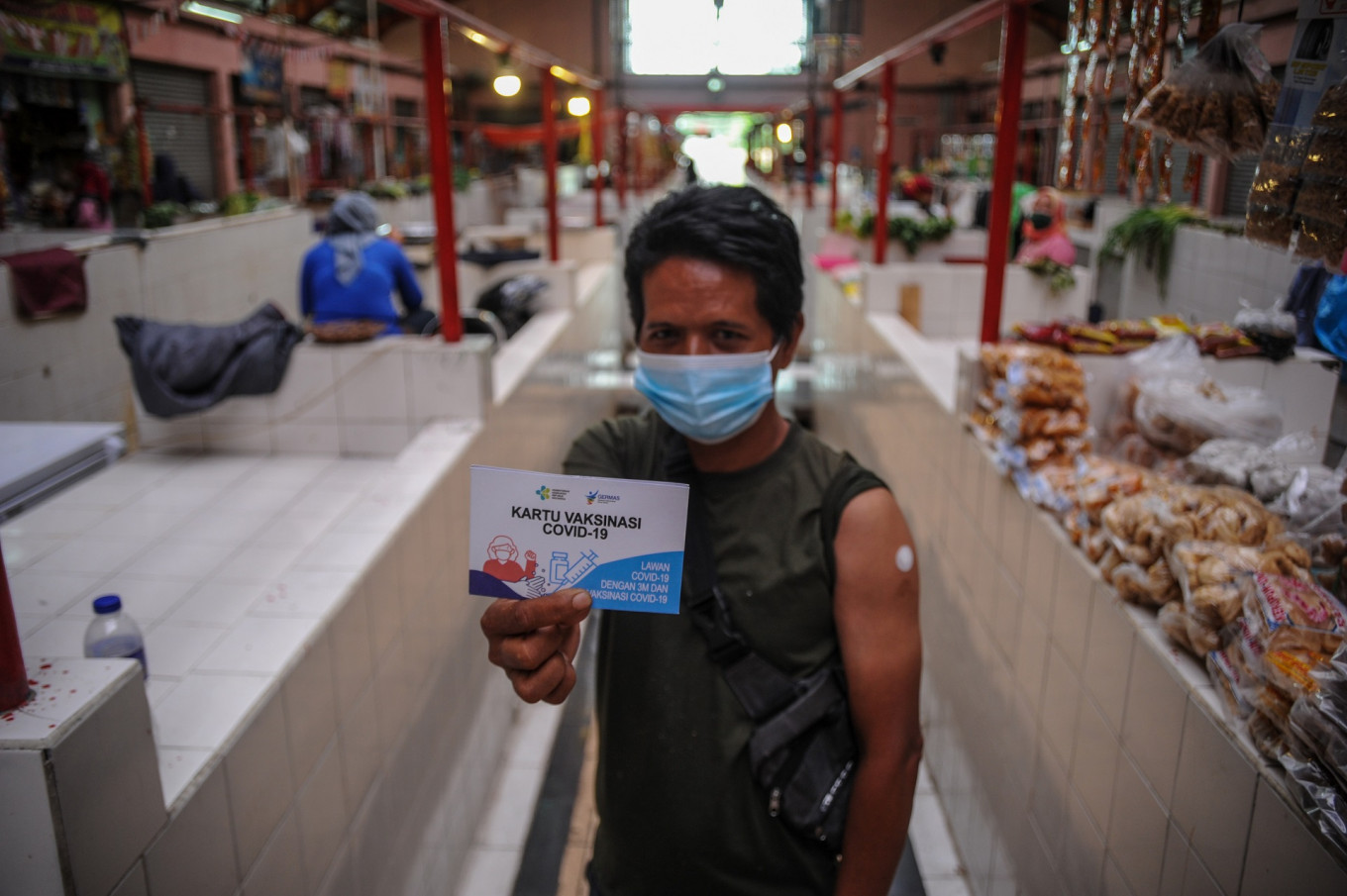Can private COVID-19 vaccination really help?
Change Size

T
he government and business players have been promoting a planned private vaccination scheme as a form of gotong royong (mutual cooperation) to help the country achieve herd immunity faster.
The scheme, dubbed the Gotong Royong Vaccination Program, will allow business owners to buy their own supplies of vaccine to be distributed to their employees. The vaccines will be administered by private health care facilities or vaccinators, who are also involved in the government’s free vaccination drive.
“There has been misinformation that the Gotong Royong Vaccination Program is designated for rich people. This is for the workers,” National COVID-19 Response and Economic Recovery Committee spokesperson Arya Sinulingga said during a virtual discussion on Tuesday.
While the Health Ministry is still preparing a technical regulation for the scheme, it stated that it would use different brands of vaccine from those used in the government’s free vaccination program amid concerns that the private scheme would disrupt the latter.
Indonesia is aiming to inoculate 181.5 million people under its free vaccination drive that is expected to run until 2022. For this program, health authorities would need around 426 million doses – most of which are fulfilled using the vaccine produced by Chinese firm Sinovac Biotech Ltd.
Read also: Indonesia has limited vaccine supplies. Is it prioritizing the right groups?
The ministry is assigned to regulate the procurement, distribution and execution of the private scheme, including the recipients’ registration to make sure that they are not registered under the free scheme.
Arya said the procurement would likely be done by state-owned firm Bio Farma, which has been in charge of the government’s vaccination program.
He added that talks were underway with several producers, such as state-backed China National Pharmaceutical Group (Sinopharm), to procure an estimated 5 to 10 million doses of vaccines for the private scheme. Arya acknowledged that global competition to secure vaccines would be a challenge for the Gotong Royong vaccination drive.
The ministry expects to start the private vaccination program after the inoculation of health care workers. The government plans to wrap up the inoculation for the second prioritized group – elderly people and essential workers – by May.
But according to media reports, President Joko “Jokowi” Widodo said the private program could start as soon as March. Health Minister Budi Gunawan Sadikin said the ministry was working to finish the regulation as soon as possible.
Observers, however, are not convinced that the private vaccination scheme will help many people. Many are concerned that the scheme will interrupt the government’s current focus on vaccinating people at risk, which has been hindered by various issues, thus increasing inequality of vaccine access.
Center for Indonesia’s Strategic Development Initiatives (CISDI) policy director Olivia Herlinda said the private scheme could shift the priority of the vaccination drive from people at risk due to the gap between the projected vaccine procured and the number of doses needed in the vaccination drive.
Citing the Health Ministry data, she said Indonesia needed 90 million doses of vaccine to inoculate essential workers and the elderly between February and April, but only 30 million doses were projected to be available by then. The government was also projected to have a deficit of 40 million doses for the drive to vaccinate residents in regions with a high transmission risk, which is planned to take place between May and July.
“Regardless of the brand, any vaccines arriving [in the country] must be prioritized for the elderly and vulnerable populations,” Olivia said, adding that such a move should be prioritized to reduce hospitalizations and deaths among high-risk groups.
Indonesia has repeatedly reiterated the importance of global vaccine access equity in international forums. The latest occurred on Tuesday, when President Jokowi said in an international conference held by Padjadjaran University’s alumni association that “no one is safe until everyone is safe”.
The President also mentioned Indonesia’s position as a co-chair in the GAVI COVAX Advance Market Commitment, a financial mechanism to ensure the world’s poorest countries get access to COVID-19 vaccines.
“I have always brought up to the United Nations the importance of equal access to vaccines for all countries,” Jokowi said.
World Health Organization senior adviser on gender and youth Diah S. Saminarsih said Indonesia should also apply the same notion within the country. “If the vulnerable populations are not prioritized, this country will not be safe from the pandemic.”
Read also: Get vaccinated or lose your social aid, Indonesian government says
Elina Ciptadi, the cofounder of volunteer group KawalCOVID-19, said the government would strain its resources by monitoring private vaccination, while they were better deployed to accelerate the ongoing vaccination drive.
A coalition of civil groups, including KawalCOVID-19, encouraged the involvement of the private sector in accelerating the vaccination drive for prioritized groups. The coalition suggested several things that businesses should do, including providing space for vaccinations, helping vaccine distribution and improving the registration for vaccine recipients.
Institute for Development of Economics and Finance (INDEF) economist Bhima Yudhistira Adhinegara doubted that business owners would provide free vaccines for their workers. Many businesses reportedly cut the income of their employees who had to undergo isolation for COVID-19.
Indonesian Chamber of Commerce and Industry (Kadin) deputy chairwoman Shinta Kamdani said businesses preferred to participate in the private vaccination scheme as it was more cost-efficient than having to test employees repeatedly for COVID-19.
According to Kadin, about 6,700 companies had registered to participate in the private vaccination scheme to help the country’s economic recovery.









